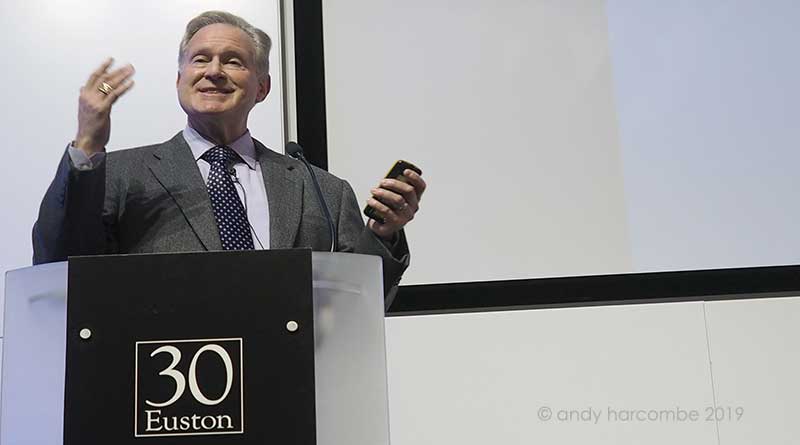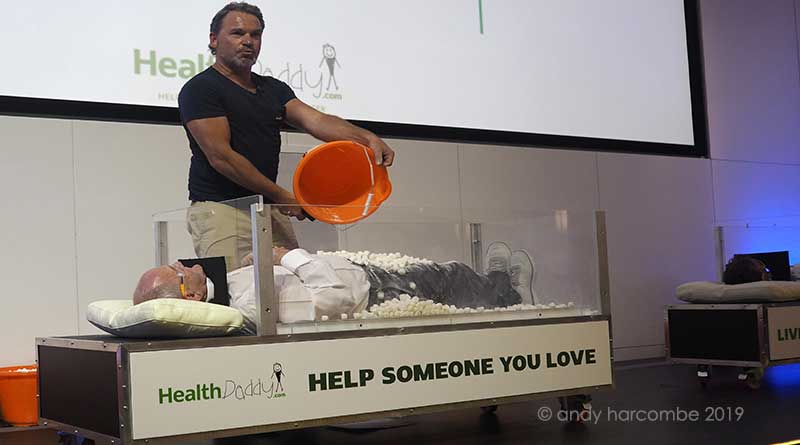Public Health Collaboration Conference 2019

The fourth Public Health Collaboration Conference was held over the weekend of the 11th-12th May 2019. The first was a one-day event in Birmingham. The second was a weekend event in Manchester. The third and fourth have been weekend events held at the prestigious venue of the Royal College of General Practitioners near Euston station in London. On this occasion, we were privileged to have Professor Mayur Lakhani, the President of the Royal College of General Practitioners (GPs) say a few words in address to the audience.
On previous occasions, I have shared my insights from the conference. After Low Carb Denver in March (2019), I asked fellow speakers to share their take-away message from their own presentation. This worked well and so I’ve asked the fabulous speakers at the PHC if they could kindly do the same and their replies are below. (I’ll update the blog post if the last couple arrive). These are in alphabetical order by surname of speaker. Each heading has the name of the speaker, their headline bio (although most will be known to you) and the title of their presentation (in quotation marks). I’ve added the Twitter details for each speaker too – many you might follow already.
Steve Bennett – businessman – “A spoonful of sugar.” @thehealthdaddy
A bit more about Steve… He is a businessman who openly admits to spending most of his adult life seriously overweight, even though he is a bit of an adventurer – having walked to the North Pole/sailed across the Atlantic with his children, etc. Steve’s companies employ over 1,000 people. His family set up The Colourful life foundation 8 years ago and have built 21 schools in Africa and India. Steve has learnt a lot about health while travelling the planet and he spoke at the PHC to give us an insight into his discoveries.
Steve’s presentation involved him wheeling two see-through coffins onto the stage and burying his father (type 2 diabetic) and his son (previously a ‘healthy fruit juice’ consumer) in sugar cubes. Each batch of sugar cubes thrown into the coffins represented what father and son had been eating in their daily diets – whether cereals, fruit or pasta/rice – so that we could all see how much sugar there really is in everyday starchy and sugary foods. It was quite something and quite a mess!

Andrew Bishop – Cisco Network Engineer and Public Health Collaboration Ambassador – “HbA1c & me: How type 2 diabetes changed my life.” @Type2Rebel
“My presentation was about my experience upon being diagnosed as a type 2 diabetic and the conventional wisdom that was passed to me and the treatment-plan I received. A month after my diagnosis I saw the documentary Fixing Dad. This got my engineer brain thinking and I embarked upon my own research where I found LCHF and real food! Within three months, my type 2 was in remission and I had become a volunteer for the PHC and later became the PHC ambassador for Liverpool. For me changing to a real food lifestyle has kept my type 2 diabetes in remission for three years.
“I am currently working with several GPs and charities involved in social prescribing and running low carb patient led groups. I also discovered Parkrun during the 2018 PHC conference, and I am now a regular walker/shuffle and jogger every Saturday and I enjoy volunteering for Parkrun as a marshal.”
Dr Peter Brukner – Australian sports medicine physician. Previously doctor to the Australian cricket team and Liverpool football club. Founder of ‘SugarByHalf’ campaign – “The state of the nation address.” @PeterBrukner
ZH note – It has become tradition at the PHC conference for Peter to do “The state of the nation address” – what has happened over the past year? Good things (progress with some dietary guidelines for type 2 diabetes) and not-so-good things (The EAT Lancet diet). It is a rollicking romp through the highs and lows of the diet and health world, and it has the audience laughing out loud. Forgive the mild expletives – but this was the cartoon message on one of the funniest slides: “Carbohydrates are the little bastards that get together at night in your closet and sew your clothes tighter. My closet is infested with the little shits!”
Peter’s take-away message: “So where are we at? There has certainly been increased awareness of the benefits of low carb over the last 12 months especially in the management of Type 2 diabetes. The efforts of David Unwin and diabetes.co.uk have seen over 400,000 people do the low carb program on their website. Support from UK politicians such as Tom Watson and Matt Hancock has been helpful and various bodies such as the American Diabetes Association (ADA) and the European Association for the Study of Diabetes (EASD) now recognize a low carbohydrate diet as safe and effective lifestyle management of T2D in adults.”
Dr Trudi Deakin – Dietician and founder of xperthealth.org.uk – “Eat less, move more and get fat! The science explained.” @XPERTHealth
“If you want to get fat ‘eat less and move more.’ If you want to lose fat and keep it off ‘eat less frequently, move more and only eat REAL foods.’”
Dr James Goolnik – Dentist and founder of rewardsproject.org – “Rewards. Thinking beyond sugar.” @jamesgoolnik
“The number one reason a 5-9 year-old is admitted to hospital in the UK is to have teeth extracted from dental decay. Shocking isn’t it? Especially when it is entirely preventable. We work with schools to shift the rewards culture away from sweets and chocolates towards sugar-free, non-food solutions. Our school partnerships aim to stop children associating sugar with feeling better and being happy. Through our work, our children will positively benefit from life-long healthy eating habits.”
Dr Zoe Harcombe – Independent author, researcher and speaker in the field of diet, health and nutrition – “What about fibre?” @zoeharcombe
I did an updated version of the fibre presentation from Low Carb Denver. The key message was: “Fibre is not an essential nutrient, which means that we don’t need to consume it; full stop. Something non-essential might still be helpful, but the evidence for fibre being helpful is distinctly lacking. Healthy people might eat fibre but there is no evidence that fibre per se makes people healthy. A low carb diet can be a superior provider of fibre than a high carb diet (more fibre for fewer carbs) and so people who manage their carb intake don’t need to worry either way.”
The main updated bit was to include a section on “Can fibre harm?” For this I used a very interesting paper, which is on open view (Ref 1). This study involved a number of people, who suffered from constipation and serious indicators of bowel discomfort. The trial administered different intakes of fibre to see which level of fibre best alleviated symptoms. Dr Paul Mason assembled some great slides from Table 2 of this paper and so I used Paul’s slides and thanked him. The answer, by the way, was that the zero fibre diet alleviated all symptoms in all people!
Patrick Holden – Farmer and Founder of The Sustainable Food Trust – “What is a sustainable and healthy diet?” @SusFoodTrust
“We need to align sustainable and healthy diets with the productive capacity, both in terms of ratio of different foods and quantity produced, with the productive capacity of the sustainable food systems which are needed to replace the unsustainable ones we have right now.
“It’s all very well designing a so-called healthy diet, but if the ingredients can only be supplied from the other end of the planet and in the process of their production are destroying rainforest or damaging soils, then that will not be a long-term sustainable solution!”
Dr Ian Lake – GP & Type 1 Diabetic & ultra-athlete – “Type 1 low carb in the keto era: respecting insulin.” @idlake
“With current guideline management of type 1 diabetes, only 6% are achieving the modest guideline target. People with type 1 diabetes are likely to have more acute and chronic complications the higher their HbA1c which measures long term control. Very low carb diets are effective in type 1 with studies reporting up to 97% reaching the target HbA1c.
“Type 1 diabetes is not protective against any other form of diabetes and many people develop metabolic syndrome.
“People with type 1 have high insulin levels and this might be driving the tendency for complications.
“Type 1 should be assessed for insulin resistance in addition to usual monitoring.
“We should be respecting insulin and aiming to inject the amount to cover the physiological needs of the body and not the carbohydrate intake.
“Very low carb should be an option for people with type 1 diabetes.”
Professor Robert Lustig – Physician, Author of Fat Chance and Hacking of the American Mind – “Corporate wealth or public health” – the keynote speech. @RobertLustigMD
“1. Sugar is toxic.
“2. The food industry knows, but doesn’t want you to.
“3. Grassroots efforts are starting to show success.”
Dr Aseem Malhotra – cardiologist, author & Professor of evidence-based medicine – Opened Saturday’s session and introduced the keynote speaker for Saturday. @DrAseemMalhotra
“If you want to truly be an advocate for improving patient and population health remember that the science ALONE is not enough, opposition from vested interests needs to be overcome. That’s why you need to grow a rhinoceros hide because you will be attacked, sometime viciously from those that profit from deliberate misinformation.”
Dr Joanne McCormack – GP & one of the founders of the Public Health Collaboration – “Re-defining ‘normal eating’ and coming off insulin.” @JoanneReynold14
“The key message from my talk is that a person can reverse diabetes by re-defining and adopting ‘normal’ eating. I presented three case studies of people who have done just that and come off insulin. One of them had been diabetic for 19 years. It’s not normal for human beings to eat processed carbohydrates and seed oils. It’s not normal to snack all the time. It’s normal to eat and prepare fresh food that has come from an animal or from the ground. Take a quick look at this three-minute video (Ref 2).”
Dr Paula Powell – Medical Director for Willowbrook Hospice – “Leading by example: Supporting a wellness approach in a small organization.” @wbhospice
“Health Professionals often find it difficult to eat well in the workplace due to multiple factors including well-meaning presents of biscuits etc from grateful patients that means that high carbohydrate snacks are easily available and hard to resist. Focusing on a Real Food approach through education and peer support can mitigate this and lead to changes in diet and behaviour that has a positive impact on individuals and teams.”
Dr Pratima Singh, Consultant Psychiatrist in the NHS – “How to practise mind-body medicine in 20 minutes with mental health patients.” @dr_pratimasingh
“My presentation focused on the increasing mortality gap in serious mental illnesses like schizophrenia and bipolar and why current interventions have failed to address this adequately. Cardiovascular mortality and poor diet are neglected areas in psychiatry. I make a case that the emerging evidence from research supporting a Mediterranean type diet and importance of the gut microbial and brain connection, indicates that diet modification needs to be discussed in every mental health consultation. This may reduce our over reliance on medication which can be problematic to stop or ineffective in some patients.”
Charlotte Summers – Chief Operations Officer for Diabetes.co.uk – “Low carb programme: Structured education and behavior change platform for type 2 diabetes and pre-diabetes.” @CharlieSummers_
“The Low Carb Program augments standard care by providing demonstrated long-term behaviour change. Developed with Dr David Unwin and 20,000 people with diabetes, the platform’s peer-reviewed, published outcomes demonstrate pioneering outcomes and unrivalled long-term sustainability: 26% achieve remission; 40% of patients starting on a medication eliminate it at 1-year; and 71% retention. NHS reference site outcomes demonstrate 97% uptake and 85% completion. The platform has been optimised using ‘big data’ of 400,000 people and how members use the platform. Localised to South Asian population in native languages. The Low Carb Program is available multi-platform: iOS, Android, web and Alexa. The Low Carb Program has been backed by NHS digital and in March this year, Low Carb Program became part of the fellowship of the NHS Innovation Accelerator.”
Dr David Unwin – a GP who is putting type 2 diabetes (T2D) into remission with a low carb/glycemic index approach. Founder of the ‘teaspoon of sugar’ graphics, now adopted by the National Institute for Care and Health Excellence (NICE). Not a fan of bananas! – “Are we blaming salt for what the sugar did?” @lowcarbGP
“Over 100 people with T2D or glucose-intolerance in my GP practice stuck to a low carbohydrate diet for an average of 2 years resulting in significant improvements in blood pressure, despite the ‘deprescribing’ of 20% of the total drugs for hypertension the cohort had been taking at the start of the intervention. There was also a 10% weight loss and significantly improved lipid parameters.
“It is likely the significant improvements in blood pressure (BP) we report were mediated at least in part through the rarely discussed physiological effects of renal sodium loss, brought about by improved insulin resistance and reduced insulin levels. People with poorly controlled diabetes tend to hold on to their sodium (salt) which may affect BP. Cutting carbs may improve insulin resistance and so cause a loss of sodium from the kidneys which improves BP. The average improvements in our cohort were 10.6mmHg Systolic, 6mmHg Diastolic.
“We wonder if our work may translate into not just significant cardiovascular protection for people with T2D but also drug budget savings. We suspect that ‘lifestyle medicine’ as an alternative to long term medication is an under used approach to chronic disease potentially popular with patients and those who fund health care. Restricting dietary carbohydrates is now recognised as one way to help control the international epidemic of T2D. Our work highlights how a simple dietary, ‘low carb’ approach may bring additional and so far under reported improvements to the increased cardiovascular risks that people with type 2 diabetes and impaired glucose tolerance face.”
Tom Watson – MP & Deputy Leader of the Labour Party – “My personal journey to sustained weight loss.” @tom_watson
Tom was interviewed by Aseem for his session, which was very appropriate as he credited the Pioppi diet for starting him on his journey. You could feel the warmth in the auditorium for Tom as he shared his personal story because it was a story that so many other people in the audience could have told. Tom lost seven stone and put his type 2 diabetes into remission with diet and exercise.
Tom shared a take-away message about the conference rather than his interview. He said of the PHC: “this is a people powered campaign to take control over their physiological future.” This fitted nicely with another of Tom’s messages. He told a funny anecdote about saying on breakfast TV that Coca-Cola is poisoning our children and then receiving a “nice letter from the top man at Coca-Cola!” Tom then had a meeting with the man from Coca-Cola and other invitations – such is the determination of such organisations to ensure that we see all calories as equal. Tom is not going to fall for that one! Tom addressed the audience and said that we will ultimately beat the likes of Coca-Cola because we care – they’re doing it for money.
One of the other big take-away messages from Tom’s interview and Q&A session was that the guidelines need to change. As Tom said “I got healthy when I ignored government guidelines. Then you get angry and irritated that you didn’t know this 20 years ago.” I asked Tom: “Do your fellow MPs know that Public Health England appointed the who’s who of the fake food industry to design the eatbadly plate?”, to which Tom replied “No!” Who said politicians don’t answer questions!
And the final words go to Sam Feltham.At one stage during the Saturday night gala dinner, when the room was buzzing ‘off-the-scale’ with chatter, laughter and energy, I gave Sam a hug and said “this is all because of you.” He should be so proud of what he has achieved already and what he still plans to do…
Sam Feltham – founder of the Public Health Collaboration who presented the closing remarks at the end of both days. @SamFeltham & @PHCukorg
“My main takeaway from this year’s conference was hope for the future. Year on year, more and more healthcare professionals are becoming aware of this movement and implementing it into their practice to help their patients and beyond. This year I was thoroughly impressed to hear what healthcare professionals and members of the public had been doing locally to better inform their communities. That’s how I think we’ll reach the early majority. With increasing numbers of people across the country and the world informing communities at a local level, and then the outcomes will speak for themselves. Before too long, it is my hope and expectation that we will live in a much-improved world with regards to public health.”
References
Ref 1: Ho KS, Tan CY, Mohd Daud MA, et al. Stopping or reducing dietary fiber intake reduces constipation and its associated symptoms. World J Gastroenterol 2012.
https://www.ncbi.nlm.nih.gov/pmc/articles/PMC3435786/pdf/WJG-18-4593.pdf
Ref 2: https://www.youtube.com/watch?v=Ec63F-w9mYM




Thank you for summarizing the key messages from the PH collaboration conference earlier this month. This is amazing work indeed and the public need to be well informed and educated regarding their health.
I have been following you on twitter for quite a while and I have gained much knowledge as a result. I have a passion for health and particularly the impact of nutrition on our health.
I attended a nutrition based conference some months ago and there is still the promotion of dietary fibres and carbohydrates are considered essential to a healthy diet despite the fact there are no essential carbohydrates. However there are essential fatty acids and amino acids.
I currently work in clinical research but looking to go into public health with a focus on preventive health and as result I decided to complete a masters in Public Health. considering the government is yet to catch up with new research that is emerging regarding CVD risks, dietary guidelines, what would advice with regards what nutrition course to do?
I just want to say a big thank you for all that you do! It is definitely making an impact and people need to be educated and aware of what is good for their health.
Hi Mobola
Many thanks for your kind words.
I did a blog on this years ago (https://www.zoeharcombe.com/2011/09/nutrition-where-will-a-student-be-taught-the-truth/) The basic problem is that a course doesn’t get recognised/accredited unless it teaches ‘conventional wisdom’ and yet – if it teaches conventional wisdom, it’s not worth doing! That’s why I did a PhD!
There will be some better than others. The first decision will be full or part time (I did the PhD full time for 3-4 years and I had been studying the subject area ‘for fun’ for a few years beforehand). Then it will be on site, or distance. I was registered in Glasgow (base near Cardiff), but spent way more time in coffee shops in Cardiff with a local professor/supervisor than I ever did trips to Scotland.
The curriculum info is then on line and you just need to plough through to see which might be the most sensible (i.e. the least fat and cholesterol phobic; the least wedded to the calorie theory etc). There will be stuff that you need to regurgitate to pass (without believing a word) but you might be able to do a novel essay or dissertation within some courses.
Good luck!
Best wishes – Zoe